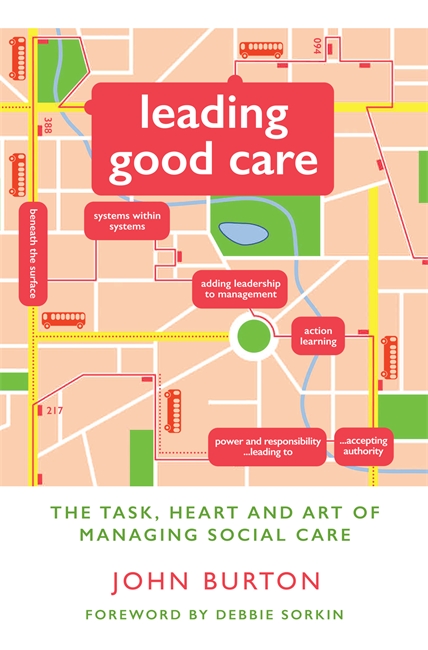In a follow-up to his last blog post, John Burton looks at the factors which cause care, and our faith in it, to break down. Leading Good Care, his most recent publication, dives into the heart of the care world’s many problems, and resurfaces with compelling advice on how to take on a social care leadership role with integrity. John has worked in social care since 1965 as a practitioner at all levels, and is now an Independent Social Care Consultant.

Strip away the irrelevant, brittle and showy exterior, all the quality and compliance waffle, the delivery and performance gobbledegook, and the key lines of regulatory assessment, to find the solid core task of caring human relationships. Focus on that and only that; put your heart and soul into the work; and use your imagination and creativity to make caring an art. That is the message of my new book, Leading Good Care.
For me, 2015 marks fifty years in social work. I started as an assistant in a run-down secondary school in a deprived area of London. I had a lot to learn there, but the real shock to my system was living as a resident in a probation hostel nearby. While I came with all the security and love of my upbringing in Devon, my fellow residents had nothing to fall back on, and the hostel provided no more than food and a small bed-space in multi-occupied rooms, in a cold and dirty little institution. My subsequent engagement with social care, and particularly with residential care, started there. I thought that surely there must be a better way of doing it.
I have worked with people of all ages, from children to the very aged, in a wide variety of places and teams, led several different services, and consulted to many others. While there have been landmark reviews and reports providing well researched support and stimulation for change and development, I find it hard to identify a single item of legislation, regulation or government guidance that has resulted in progress in social care. Nor can I think of “improvement agencies” or regulatory regimes that have substantially improved care.
No, the effect of central and top-down efforts to improve care is to corrupt it, and to undermine and weaken the role of those who lead care services on the ground, people like care home managers. With the best of intentions but lacking understanding of how good care is created, the current regulator and inspector of social care in England, the Care Quality Commission, has made its requirements for conformity the central objective of all but the most determined and confident social care managers. We pay many £millions to carry this millstone around our necks.
Look at Winterbourne View. The place was rotten to the core but it operated within the legislative and regulatory regime. It was inspected, people were sent to live there, and the owners charged the taxpayer £3,500 a week for “assessment”, “care” and “treatment”. It would still be open if there hadn’t been a brave and principled whistleblower and a Panorama programme. For nearly four years there have been unceasing panic, blame and denial. Parliament has gorged itself on the horrors of such places. Ministers decree that they will close. Nearly four years later very little has changed, yet politicians, civil servants, and the great and good of social care continue to put their faith in the same institutions and methods that have so abjectly failed to bring about change. Such scandals have punctuated the last fifty years, yet there are many wonderful, creative, joyful places that defy the corruption of this culture of compliance, the constipation of this rule-bound regime, this bullying bureaucracy of blame.
The most basic knowledge of the sociology and psychology of organisations tells us that the culture and relationships at the top determine the way the workforce behave with each other and perform their task. Social care works well when the team is well led (yes, CQC have got that one right) and the core task is the only task. It works well when all the external managers and organisations understand that their role is to resource, support and enable the core task to be carried out. Social care goes wrong when the core task is corrupted by the demands of those above and outside, when manager finds themselves distracted by compliance, form filling, attending to the needs of the managing organisation or the regulator or the local authority . . . by a hundred different jobs that take them away from meeting the needs of clients and the staff that care for them.
Managers lose heart when they collude with a corrupting system. To lead good care, the manager has to have that drive and belief, the professional authority, pride and principles to resist, to join with other like minded managers, and to say “no” when told to comply with demands that corrupt the core task.
John Burton has worked in social care since 1965 as a practitioner at all levels, and as a manager, writer, trainer, researcher, inspector and consultant. Learn more about Leading Good Care by John Burton here.